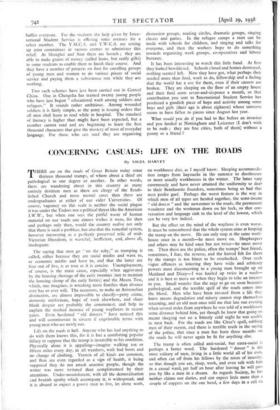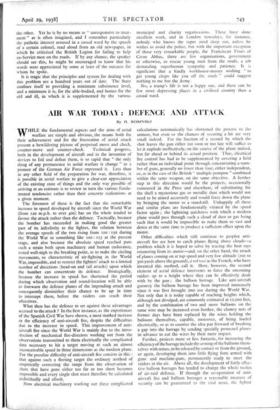CONCERNING CASUALS: LIFE ON THE ROADS
By NIGEL HARVEY
THERE are on the roads of Great Britain today some thirteen thousand tramps, of whom about a third are pathological to one degree or another. In other words, there are wandering about in this country as many entirely destitute men as there are clergy of the Estab- lished Church and more mental cases than there are undergraduates at either of our older Universities. Of course, vagrancy on this scale is neither the social plague it kvas under the Tudors nor a political threat like the American I.W.W., but when one sees the pitiful waste of human material on our roads one almost wishes it were, for then and perhaps only then, would the country realise not only that there is such a problem, but also that the remedial system, however interesting as a perfectly preserved relic of mid- Victorian liberalism, is wasteful, inefficient, and, above all, inadequate. THERE are on the roads of Great Britain today some thirteen thousand tramps, of whom about a third are pathological to one degree or another. In other words, there are wandering about in this country as many entirely destitute men as there are clergy of the Estab- lished Church and more mental cases than there are undergraduates at either of our older Universities. Of course, vagrancy on this scale is neither the social plague it kvas under the Tudors nor a political threat like the American I.W.W., but when one sees the pitiful waste of human material on our roads one almost wishes it were, for then and perhaps only then, would the country realise not only that there is such a problem, but also that the remedial system, however interesting as a perfectly preserved relic of mid- Victorian liberalism, is wasteful, inefficient, and, above all, inadequate.
The saying that men go "on the toby-," as tramping is called, either because they are social misfits and want to, or economic misfits and have to, and that the latter are four out of five, is as true as it is concise. Unemployment, of course, is the main cause, especially when aggravated by the housing shortage of the early twenties (not to mention the housing slump of the early forties) and the Means Test, which, one. imagines, is wrecking more families than divorce ever has or ever will. The occasions, to make an Aristotelian distinction, are almost impossible to classify—petty crime, domestic misfortune, hope of work elsewhere, and sheer blank despair are probably the commonest, and help to explain the marked increase of young wayfarers in recent years. Even hardened "old dossers" have noticed this and will commiserate in sincere if unprintable terms with young men who are newly out.
Life on the roads is hell. Anyone who has had anything to do with them knows this, for it is but a comforting popular fallacy to suppose that the tramp is insensible to his condition. Physically alone it is appalling—imagine walking ten or fifteen miles every day, in all weathers, with bad boots and no change of clothing. Vermin of all kinds are common, and fleas are even regarded as a sign of health, it being supposed they do not attack anaemic people, though the writer was more irritated than complimented by their attentions. Under-nourishment, with all the demoralisation and brutish apathy which accompany it, is widespread, and it is absurd to expect a grown man to live, let alone work, on workhouse diet, as I myself know. Sleeping accommoda- tion ranges from haystacks in the summer to dosshouses or more usually workhouses in the winter. The latter vary enormously and have never attained the uniformity so dear to their Benthamite founders, sometimes being so bad that men prefer gaol. Perhaps the worst feature is the way in which men of all types are herded together, the semi-insane "old dossar "and the newcomer to the roads, the permanent wanderer and the workman down on his luck, so that con- versation and language sink to the level of the lowest, which can be very low indeed.
But the effect on the mind of the wayfarer is even worse. It must be remembered that the whole system aims at keeping the tramp on the move. He can only stop at the same work- house once in a month—he must move on. Shopkeepers and others may be kind once but not twice—he must move on. Then there are the police, often the tramps' best friend, sometimes, I fear, the reverse, and the hatred felt for them by the tramps is too bitter to be overlooked. Over such vague offences as loitering they have wide and arbitrary powers most disconcerting to a young man brought up on Maitland and Dicey—I was hauled up twice in a week— and it is best to move on when they begin to take an interest in you. Small wonder that the urge to go on soon becomes pathological, and the terrible spell of the roads enters into the blood. Men who have been rescued from a life they know means degradation and misery cannot stop themselves returning, and an old man once told me that late one evening when several miles from anywhere he was told of a workhouse some distance behind him, yet though he knew that going on meant sleeping out on a bitterly cold night he was unable to turn back. For the roads are like Circe's spell, robbing men of their reason, and there is terrible truth in the saying of the police, that once a man has been three months on the roads he will never again be fit for anything else.
The tramp is often called anti-social, but extra-social is perhaps a better word. The hardened " dosser " is the most solitary of men, living in a little world all of his own, and often cut off from his fellows by the mists of insanity, so that though you eat, sleep, work, and even talk with him in a casual ward, yet half an hour after leaving he will pass you by like a man in a dream. As regards Society, he has neither claims nor duties, and can expect little more than a couple of coppers on the one hand, a few days in a cell on the other. Yet he is by no means as "unresponsive to treat- ment" as is often imagined, and I remember particularly the pathetic interest aroused in a casual ward by the speech of a certain colonel, read aloud from an old newspaper, in which he criticised the British Legion for failing to help ex-Service men on the roads. If by any chance, the speaker should see this, he might be encouraged to know that his words were appreciated by some at least of the outcasts for whom he spoke.
It is tragic that the principles and system for dealing with this problem are a hundred years out of date. The State confines itself to providing a minimum subsistence level, and a minimum it is, for the able-bodied, and homes for the old and ill, in which it is supplemented by the various municipal and charity organisations. These have done excellent work, and in London nowadays, for instance, nobody who knows the ropes need sleep out, unless he wishes to avoid the police, but with the important exception of those very remarkable people, the Franciscan Friars of Cerne Abbas, there are few organisations, government or otherwise, to rescue young men from the roads, a job demanding superhuman sympathy and patience. It i--. significant that a kindly workhouse-master wishing "to get young chaps like you off the roads " could suggest nothing to me but the Army.
No, a tramp's life is not a happy one, and there can be few more depressing places in a civilised country than a casual ward.



























































 Previous page
Previous page